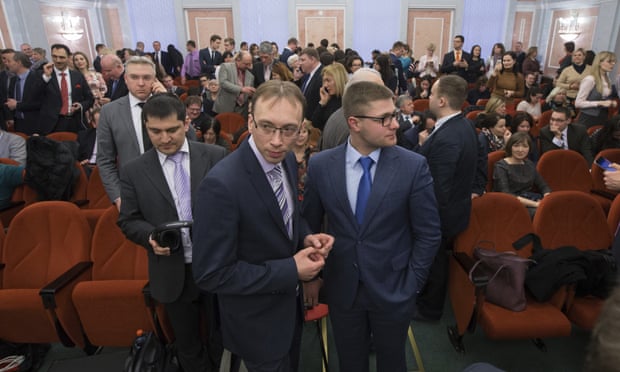The brutal treatment of this small, resolutely non-violent religious group is loathsome testimony to the ruthlessness of Russia’s authoritarian regime.
Andrew Brown
The Guardian
April 25, 2017
Hardly anyone noticed last week when the Russian supreme court last week suppressed the Jehovah’s Witnesses there and seized all the group’s property. We were all too busy worrying about fascism in France or war in Korea. But it was a very important blow against the principle of freedom of belief. The Jehovah’s Witnesses are mostly regarded as slightly ludicrous in the UK. They have odd beliefs about blood and a slightly unhealthy interest in the end of the world and that’s the end of what most people know, if they know anything.
A more important tenet of their faith is their refusal of military service. They refuse conscription and even non-violent “war work”. This stance led them to be persecuted in almost all the countries that fought the second world war. They were imprisoned in Britain and the US, and persecuted viciously under Hitler: by the end of the war half the Witnesses in Germany were in concentration camps and a quarter of them had died.
This is an impressive record of non-violent stubbornness. It makes them about the most determinedly harmless fundamentalists in the world today. In Russia, though, they have been treated almost as if they were violent fundamentalists since at least 2004. Their meeting places, known as Kingdom Halls, have been raided; members have been imprisoned for refusing military service, and the ministry of justice has sued to have them declared an extremist organisation.
If last week’s decree is not overturned on appeal, these people will lose their Kingdom Halls. The central, co-ordinating headquarters will also be taken by the state, and vast quantities of literature deemed “extremist”, such as the Witnesses’ Bible translation and even, in one earlier raid, a picture book of Bible stories for children without words at all.
The Witnesses blame this on the resurgent power and authority of the Orthodox church which has flourished under Vladimir Putin, and at the same time revived its historical suspicion and, where possible, persecution of Protestant and Catholic churches. The Witnesses, as the Protestant sect that deviates most from the values of the society around it, have been harassed even more than the Baptists. According to Forum 18, an organisation that monitors religious freedom in Russia and the former Soviet bloc, the only other group to have been pursued in this way is a Sunni sect that may not even exist.
The spread and survival of the Witnesses over the last century shows two central characteristics of religious belief: held strongly enough, it can become more precious than life to believers; and its strength has no simple relationship with its plausibility to unbelievers. If anything, the scorn and hostility of outsiders tends to strengthen the fervour and cohesion of the persecuted group. There are now more than 8 million Witnesses internationally, and more than 170,000 in Russia.
Their persecution around the world is a horrible testament to the relish we take in the bullying of small, alien and defenceless groups. In Russia it is yet another testimony to the ruthless and brutal dishonesty of the Putin regime. All authoritarian regimes loathe minority religions, perhaps because religious groupings are one of the most powerful ways of imagining a world that might be different.
Tolerance is a late and perhaps unnatural development in human history but that only increases its value. Freedom of religion means freedom to be wrong or it means nothing at all. And in the case of the Witnesses, with their astonishing stubborn patience in the face persecution, we can see how the content of their beliefs really doesn’t and shouldn’t affect their right to hold them.
At a time when most of the concern about Putin’s Russia is concentrated on its behaviour abroad, the attempted suppression of the Witnesses shows just how much damage he can do within his own borders.
https://www.theguardian.com/commentisfree/2017/apr/25/jehovahs-witnesses-russia-putin-persecution
Andrew Brown
The Guardian
April 25, 2017
Hardly anyone noticed last week when the Russian supreme court last week suppressed the Jehovah’s Witnesses there and seized all the group’s property. We were all too busy worrying about fascism in France or war in Korea. But it was a very important blow against the principle of freedom of belief. The Jehovah’s Witnesses are mostly regarded as slightly ludicrous in the UK. They have odd beliefs about blood and a slightly unhealthy interest in the end of the world and that’s the end of what most people know, if they know anything.
A more important tenet of their faith is their refusal of military service. They refuse conscription and even non-violent “war work”. This stance led them to be persecuted in almost all the countries that fought the second world war. They were imprisoned in Britain and the US, and persecuted viciously under Hitler: by the end of the war half the Witnesses in Germany were in concentration camps and a quarter of them had died.
This is an impressive record of non-violent stubbornness. It makes them about the most determinedly harmless fundamentalists in the world today. In Russia, though, they have been treated almost as if they were violent fundamentalists since at least 2004. Their meeting places, known as Kingdom Halls, have been raided; members have been imprisoned for refusing military service, and the ministry of justice has sued to have them declared an extremist organisation.
If last week’s decree is not overturned on appeal, these people will lose their Kingdom Halls. The central, co-ordinating headquarters will also be taken by the state, and vast quantities of literature deemed “extremist”, such as the Witnesses’ Bible translation and even, in one earlier raid, a picture book of Bible stories for children without words at all.
The Witnesses blame this on the resurgent power and authority of the Orthodox church which has flourished under Vladimir Putin, and at the same time revived its historical suspicion and, where possible, persecution of Protestant and Catholic churches. The Witnesses, as the Protestant sect that deviates most from the values of the society around it, have been harassed even more than the Baptists. According to Forum 18, an organisation that monitors religious freedom in Russia and the former Soviet bloc, the only other group to have been pursued in this way is a Sunni sect that may not even exist.
The spread and survival of the Witnesses over the last century shows two central characteristics of religious belief: held strongly enough, it can become more precious than life to believers; and its strength has no simple relationship with its plausibility to unbelievers. If anything, the scorn and hostility of outsiders tends to strengthen the fervour and cohesion of the persecuted group. There are now more than 8 million Witnesses internationally, and more than 170,000 in Russia.
Their persecution around the world is a horrible testament to the relish we take in the bullying of small, alien and defenceless groups. In Russia it is yet another testimony to the ruthless and brutal dishonesty of the Putin regime. All authoritarian regimes loathe minority religions, perhaps because religious groupings are one of the most powerful ways of imagining a world that might be different.
Tolerance is a late and perhaps unnatural development in human history but that only increases its value. Freedom of religion means freedom to be wrong or it means nothing at all. And in the case of the Witnesses, with their astonishing stubborn patience in the face persecution, we can see how the content of their beliefs really doesn’t and shouldn’t affect their right to hold them.
At a time when most of the concern about Putin’s Russia is concentrated on its behaviour abroad, the attempted suppression of the Witnesses shows just how much damage he can do within his own borders.
https://www.theguardian.com/commentisfree/2017/apr/25/jehovahs-witnesses-russia-putin-persecution


No comments:
Post a Comment